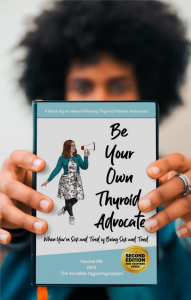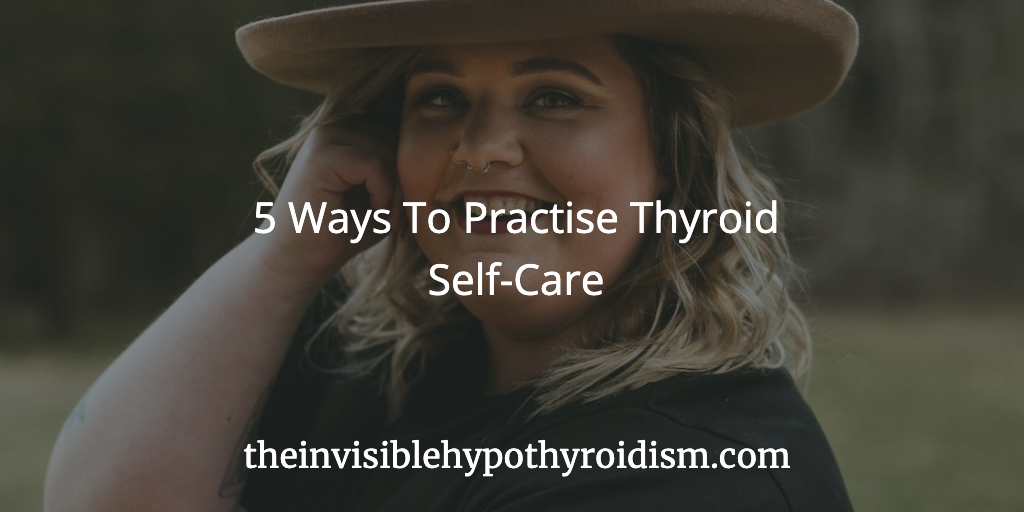Originally published on 28th June 2022 Last updated on 16th February 2024
Self-care isn’t just bubble baths, face masks and duvet days. Self-care is the very practice of taking action to preserve or improve your health.
It can be great for your stress levels, mental health and wellbeing to find things that let you recharge and de-stress such as bubble baths, face masks and duvet days, but self-care should also implement what preserves and improves your physical health too.
As a thyroid patient, what does this mean?
1. Have Comprehensive Testing
Getting the right things tested with a thyroid condition is crucial. Testing the ‘full thyroid panel‘ (or ‘thyroid function test’ as it is sometimes known), gives the full, comprehensive view of your thyroid health, how treatment is working and how management could be improved.
The full thyroid panel consists of:
- TSH
- Free T3
- Free T4
- Thyroid peroxidase antibodies
- Thyroglobulin antibodies
However, many thyroid patients fall at the first hurdle when doctors only test TSH, a pituitary hormone (not a thyroid hormone), which gives an indication of thyroid hormone levels, whereas Free T3 and T4 give the actual levels. The antibody tests also diagnose and monitor Hashimoto’s Thyroiditis, the most common cause of hypothyroidism. [1]
Not having all these tested means you are missing part of your treatment and management puzzle and therefore, may not be getting the best treatment for you. Many thyroid patients find that they need a different dosage and/or type of thyroid medication, upon having all of these tests ran, when TSH alone would not pick up on this.
Have you also checked if you have the autoimmune disease Hashimoto’s Thyroiditis by having your thyroid antibody levels tested?
It’s good to know if you have Hashimoto’s because if you do, there are things you can do to lower the antibodies, and keeping antibodies low is important if you want to stop any further damage being done to your thyroid gland. Getting my antibodies low and Hashimoto’s in to remission was key in helping me to manage my thyroid condition and feel better long term.
It’s worth knowing that you can order full thyroid panels yourself from online laboratories too. Find a UK lab here and a US lab here.
Related Article: Signs Your Thyroid Medication May Need Adjusting
2. Exercise in The Right Way
Many people (and a lot of thyroid patients) fixate on exercise just being there for weight loss, but we should all be exercising daily for overall good health. Find what you enjoy and what helps you to keep in balance. Exercise should help you to unwind, feel calm and de-stress.
If exercise leaves you feeling worse physically, you may be over exercising or doing the wrong kind of exercise for you. Those with chronic health conditions such as thyroid disease often need to reevaluate and adapt their exercise regimen post-diagnosis so as not to make their symptoms, such as fatigue, worse.
Repeatedly engaging in overly demanding exercise can cause a surge of biochemical imbalances to occur within the body, including the disruption of the hypothalamus-pituitary axis, which can reduce thyroid function. Intense cardio, marathon running and training, obsessive weight lifting etc. with little to no recovery time can all cause extreme stress to the body and particularly the thyroid.
So, it is important for us to know when we need to slow things down or change things up. Listening to our bodies is crucial and taking things at our own pace will help us avoid causing any issues with over exercising.
Read about the types of exercise that work for many thyroid patients here.
3. Optimise Rest
This probably sounds obvious, but it’s simple self-care to ensure you have a good bedtime routine and stick with it. This is especially true for anyone managing a longterm health condition. Bodies with chronic illness need extra time to recuperate and recharge.
We should all aim to get 7-9 hours of sleep a night and stop electronics usage 1-2 hours before bed. You can also try a bath with Epsom salts. See this article for tips on maximising your sleep and improving any sleep complaints you may have, such as insomnia.
4. Eat Nutritiously
Your diet can play a big part in how you feel. Many thyroid patients state they feel better when they avoid gluten for example. Others that can exacerbate thyroid symptoms may include alcohol, caffeine, goitrogens, soy, dairy, eggs etc. Read more here.
It is also important to ensure that you are eating a nutrient dense diet. You can’t expect your body to function well if you don’t give it the right nutrients and useful stuff.
As many of us are prone to imbalanced blood sugar levels too, it’s helpful to ensure that we’re keeping blood sugar balanced. Being more aware of eating less sugar and more protein and healthy fats is often a simple enough change to banish the fatigue, nausea, acne, hangry feeling (being hungry and angry) and sugar cravings of blood sugar imbalances. This can in turn improve your adrenal and thyroid health.
Find cookbooks for thyroid patients here and here.
5. Embrace Being Your Own Thyroid Health Advocate
No one knows your body as well as you do.
‘Be Your Own Thyroid Advocate’ is literally the tagline of my website and name of my book.
I’ve made it no secret that the reason I was able to go from barely functioning thanks to hypothyroidism, to finally getting my health back on track again and resuming a normal quality of life, is because I took ‘be your own thyroid advocate’ literally.
I had to learn to be my own advocate when it came to my health, because being passive in my own healthcare meant I stayed unwell.
To be your own health advocate means to:
- Understand your thyroid condition and what it means – via research e.g. studies, books, blogs and online resources
- Understand options in terms of treatment, management and the level of care you are entitled to receive
- Go in to your medical appointments armed with the knowledge and tools you need to make sure you’re taken seriously and treated properly
I tell thyroid patients to keep trying different doctors until they find one they can build mutual respect with – one who will listen. I tell them to write down everything they want to say so that the intimidation of a trained professional doesn’t make them forget anything. I explain to them that you’re best working together as a team and let them know that you want to be a partner with them in your healthcare. After all, you are an active participant in your own health.
Most importantly, listen to your body. You know better than anyone if something isn’t right and if you’re still not feeling as well as you could do, you deserve to push for a better quality of life.
Other Self-care Ideas
- Keep a list of accomplishments for each day, to help you reflect on what you should feel proud of. If getting out of bed was difficult, this is an accomplishment. Sometimes we can get bogged down in what we haven’t managed to get done that day, but we should be focusing on what we did do, as well.
- Tidy, clean out or reorganise a draw, cupboard, space etc. Getting something organised can feel therapeutic and it could be something small like a draw in your desk, the clothes in your wardrobe or your whole spare room at home. Just take your time and don’t over do it.
- Schedule in a regular phone call with a friend or family member for a catch up and just chat about whatever comes to mind. A weekly half hour phone conversation with a friend can help combat feelings of loneliness and stress, and in our busy world, it can sometimes feel difficult to keep up with and in touch with those we love. Making it part of your routine can help this and you may find you start to look forward to it.
- Go for a walk in a park. If you can’t physically walk too far, find a spot to sit and watch your surroundings. Listen to the sounds and look closely at the details around you. The way the breeze feels on your skin and how sunlight penetrates through the trees. Take a blanket to sit/lie on and possibly a book.
- Read a book.
- Take a bath. I love a bath but I also like an Epsom salt bath to help me relax and recharge. Lighting some candles and putting on some relaxing music whilst you relax can help, too.
- Fix a small annoyance at home that’s been bugging you, such as a missing button, a broken door handle, a light bulb that’s gone, a picture that needs hanging etc.
- Try meditation. It can help you feel back in touch with yourself and ease stress.
- Try acupuncture. It has been reported to help with pain and stress.
- Unplug yourself for an hour or even a day. Switch off from phones, computers, the TV, social media etc.
- Whilst we’re on about social media, edit your feeds on Facebook and Instagram for example and take out any negative people or sources. If you don’t want to unfriend, unfollow or delete them, you also have the option to hide their posts from showing up on your feed.
- Also look at removing any negative people or energy stealers from your life, too. Life is too short to have people who bring you down in your life. They’re not good for your mental or physical health and even if they’re family, you shouldn’t feel bad about removing them from your life or limiting contact for your health and well-being.
- Try a massage. You could go to a masseuse, ask your partner to give you a leg or back massage or even have a go on yourself. YouTube has helpful videos on giving hand, neck, head, leg and feet massages which you could do yourself. They can be super de-stressing, help you get ready for sleep and feel rejuvenated.
- Listen to music. I truly believe that there’s not much listening to music can’t help. A good sing or even boogie can raise feel good chemical levels and raise spirits. Make a playlist of songs that make you feel motivated and give positive vibes and play it when you’re feeling particularly low, stressed out or in need of some good songs.
- Give yoga a go. Just like acupuncture and meditation, it can be good for stress levels and can even be practised in the comfort of your own home. YouTube has helpful videos.
- Try cooking a new meal. Something wholesome. Pick up a cookbook or look up some online. It’s important to give your body what it needs and eat well. Take some time to prepare something your body will thank you for.
- Find something that makes you laugh. A comic series, your favourite TV show or even some old photos and memories. Laughing is a very powerful mechanism.
- Animals and pets are proven to lower stress levels. If you don’t have a pet, maybe visit a friend or family member who does, more often and see if it helps. Offer to look after their pets for them. You could also visit a zoo, sanctuary, rescue centre, cat cafe etc. (Yes, cat cafes do exist!)
- Give a TV show or film you’ve never seen a go and see if you discover something new you love.
- Do something crafty. Make a card for an upcoming friend’s birthday, create a pin board, try knitting or even making a sock monkey. There are countless arty ideas you could try and there’s bound to be something for everyone. Visit a hobby/craft store for inspiration.
- Hang out with friends. Maintaining a social life can help a lot mentally. Go for coffee, a sit in the park or watch some Netflix together and spend time with someone else.
- Light a candle, some essential oils or other fragrances and relax.
- Write your thoughts and feelings down. Whether it’s with good old fashioned pen and paper, your phone or laptop, write out how you’re feeling and any thoughts you have at that moment in time. Create a mind-map of all your worries and stressors and take them one by one.
- Write down compliments. When someone says something nice about you, write it down and put it in a notebook or even a jar. Read them back to yourself on low days.
- Have a duvet day. Grab your duvet, some snacks and drinks and snuggle in to the sofa with books, DVD’s and a cuddly toy or your partner.
- Consider support. If you’re struggling with your mental health and wellbeing, you could consider whether you’d benefit from help such as counselling or therapy. There are many options and services out there, but often most convenient for chronic illness patients is online therapy and help. Better Help are one service offering this support. Please see more information here: https://www.betterhelp.com/online-therapy/ (This link Has BEEN SPONSORED BY BetterHelp)
Is there anything else you would add to this list? Let me know in the comments below.
You can click on the hyperlinks in the above post to learn more and see references to information given.
Do you practise these forms of thyroid health ‘self-care’?
You can click on the hyperlinks in the above post to learn more and see references to information given.
Related article: Simple Ways Thyroid Patients Can Practise Self-Care

The book Be Your Own Thyroid Advocate: When You’re Sick and Tired of Being Sick and Tired, which builds on this article in detail. Live a thyroid healthy life.
References:
[1] https://www.ncbi.nlm.nih.gov/pubmed/3066320






